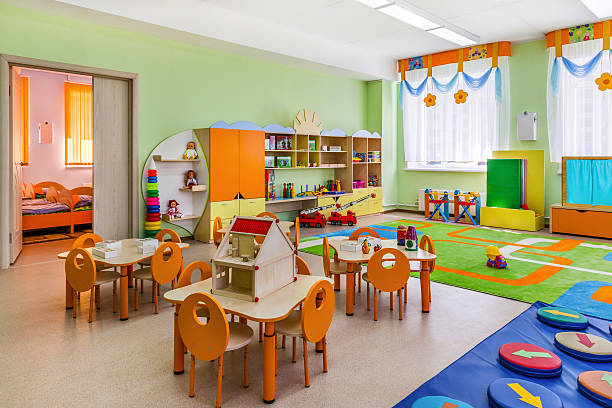A trusted day care center is more than a place to watch children; it is a place where they learn and grow socially, emotionally, and mentally. At our day care center Hawthorne, we provide social skills, where children meet friends outside their family. These early bonds build confidence, teach teamwork, and prepare them for future relationships. With every game, laugh, and group activity, children learn their role in a community that helps them grow.
Social growth does not just happen—it is guided with care. Children learn how to share feelings, adjust to groups, and understand others. So, the setting itself supports learning through both free play and planned tasks. Instead of staying in family routines, they enter a space where they gain lasting skills. These early years matter because habits formed now shape future growth. Parents who value social skills know the need for placing children where social learning happens every day.
Learning Through Play: Day Care Center Hawthorne
Play is more than fun—it is how children understand the world. Our day care center Hawthorne plans activities that build sharing, patience, and creativity. These playful moments teach problem-solving in ways books cannot. In groups, children learn kindness, teamwork, and empathy while enjoying themselves.
Play also helps children test limits safely. For example, when blocks fall, they learn persistence. When toys are shared, they discover fairness. Games show them the rules while still letting them find their voice. So, each playful moment builds skills for school, friendships, and daily life. So, even quiet children find ways to join, which builds confidence and belonging. Play is not just filling time—it prepares children for the future.
| Benefits of Play at Day Care | Why It Matters |
|---|---|
| Sharing toys and games | Builds fairness and kindness |
| Group storytelling | Improves speaking skills |
| Pretend play | Encourages empathy and imagination |
| Cooperative activities | Teaches teamwork |
Growing Communication Skills
Language grows when children have opportunities to listen and speak. In structured care, children learn to take turns talking, read facial expressions, and share feelings with words. Daily peer talk builds vocabulary, listening skills, and confidence, which are steps to becoming strong communicators in school and life.
Learning to communicate early has lasting effects. Children who speak clearly do better in class because they can share ideas and ask questions. Group talk also prevents loneliness, helping children connect with others. Confidence in speaking reduces frustration and supports better behavior. A child care center helps children practice kindness and respect in every conversation.
Building Emotional Strength
Daily moments at child care teach children to handle feelings. Learning to deal with losing a game or celebrating with friends builds resilience. So, these lessons in balance prepare them to face challenges with less stress as they grow.
Emotional strength is vital because life always changes. By learning self-control early, children adapt better. Seeing friends manage joy or sadness teaches empathy. Facing small setbacks builds patience. Our child care agency Hawthorne, guides them, but true growth happens in peer moments where feelings are real. These skills last into adulthood, shaping how people handle stress, conflict, and relationships.
Respect and Responsibility
In structured care, children learn that actions affect others. Rules like waiting turns, sharing, and cleaning up teach respect and accountability. With daily practice, these lessons become natural. Over time, children learn fairness and empathy as part of life.
Respect and responsibility build strong character. Rules teach discipline, and respecting others builds empathy. Responsibility grows as children see the need to clean up or wait their turn. So, these lessons prepare them for the school structure. Respect also extends to teachers, showing children how to value authority while expressing their needs. Trust and teamwork grow as these habits take root.
Friendships Beyond Family
Friendships made in early years leave a lasting mark. In nurturing care, children find friends to play and learn with. These bonds teach trust, loyalty, and belonging. Feeling included builds security and prepares them for school.
Friendships often begin with simple play. A puzzle, a laugh, or a shared game builds bonds. These teach patience, compromise, and forgiveness, so even small conflicts become lessons in solving problems. Later in life, these skills help children work in teams and respect different views. Friendships beyond family also help them adapt to new people and settings.
Preparing for School and Beyond
Skills from early socialization go far beyond childhood. Cooperation, problem-solving, and empathy are key to success in school and life. Children in structured care adapt faster to classrooms, work better in groups, and face challenges with maturity.
School readiness is more than academics. Children must share space, follow directions, and work in groups. So, a strong base in social skills lets them focus on learning. Social confidence eases the move to school, lowering stress for families. As children grow, these skills carry into work, where communication and teamwork are essential.
Learning Independence
Independence grows when children make small choices in safe places. Our child care agency Hawthorne, gives them chances to solve problems, follow routines, and complete tasks without parents. This builds confidence and shows they can make decisions.
Independence does not mean acting alone—it means taking responsibility. So, choosing toys, joining art projects, or cleaning up gives children control. These small steps prepare them for bigger decisions later. Independence also builds accountability, as children see how actions affect others. Structured practice leads to self-discipline, which is key to school success.
Independence Skills
- Choosing activities builds decision-making
- Managing belongings teaches responsibility
- Helping peers encourages kindness and leadership
Long-Term Benefits
- Stronger peer relationships
- Better teamwork in groups
- More confidence in speaking
- Greater resilience to challenges
Final Thoughts
Early lessons in teamwork and connection leave marks for life. From speaking to leading, every skill shapes balanced, caring people. Parents looking for the right support find that our daycare center Hawthorne, is not only supervision—it is a path to growth.
The value of socialization is clear. Every game, every group activity, and every shared story builds lifelong skills. Children raised in social settings often grow more confident, emotionally healthier, and more adaptable. These benefits affect school, careers, and relationships. Choosing social learning is choosing a stronger future.
LOK Preschool & Child Care Center supports children with chances to build social skills, confidence, and independence, ensuring they grow into capable, caring individuals.

















Leave a comment